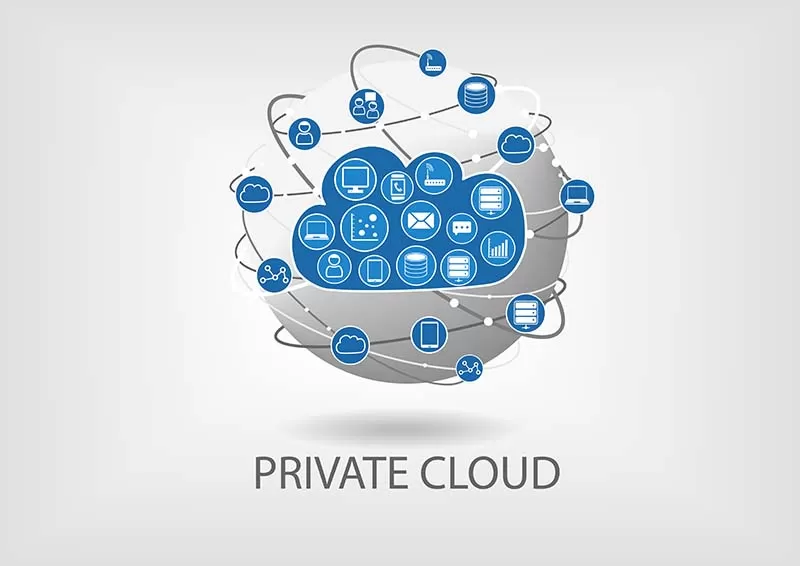Written By:
Scott McAuley
Scott is the IT Director of Texas Management Group, and has been in the IT industry for 25 years.
In today’s digital era, businesses are constantly seeking ways to gain a competitive edge and enhance operational efficiency.
Enter the private cloud—a tailored solution that combines flexibility, security, and control. But what exactly makes it such a smart business move?
This article delves into the top 10 benefits of private cloud, highlighting why it’s becoming the preferred choice for forward-thinking companies.
Ready to discover the benefits of private cloud and see if it’s the right fit for your organization? Let’s dive in!
Key Takeaways
- Private clouds offer dedicated resources, ensuring enhanced security and control for businesses managing sensitive data or complying with strict regulations.
- There are four primary types of private clouds: on-premises, virtual, hosted, and managed, each offering distinct benefits and management responsibilities.
- Private clouds provide advantages such as full control, greater visibility, customization, enhanced security, and improved compliance with regulatory standards.
- Potential drawbacks of private clouds include high initial costs, complex maintenance, limited scalability, restricted mobile access, and the risk of vendor lock-in.
- When choosing between public, private, and hybrid clouds, businesses must assess their security, scalability, cost, control, and management requirements to make the best decision.
Table of Contents
What is a Private Cloud?

A private cloud is a cloud computing model that provides dedicated resources and infrastructure exclusively for a single organization.
Unlike public clouds, where resources are shared among multiple users, a private cloud ensures that all hardware, storage, and network components are isolated, offering enhanced security and control.
Key Characteristics of a Private Cloud:
- Dedicated Resources: Private clouds allocate specific computing resources solely for one organization, ensuring no shared infrastructure with other entities.
- Enhanced Security: With isolated resources, private clouds offer superior data protection, making them ideal for sensitive or regulated environments.
- Customization: Organizations can tailor the private cloud to meet specific operational requirements, integrating seamlessly with existing IT systems.
- Control and Compliance: Greater control over the infrastructure allows businesses to meet stringent compliance and data residency requirements.
- Flexibility and Scalability: Through virtualization, private clouds can dynamically allocate resources to meet changing demands, offering cloud-like scalability.
How Does a Private Cloud Work?
A private cloud leverages virtualization technology to create a pool of computing resources, which can be dynamically allocated to various workloads.
This infrastructure, including servers, storage, and networking, is dedicated solely to a single organization, providing greater control, customization, and security compared to public clouds.
Key Components of a Private Cloud:
- Virtualization: Virtualization creates a virtual version of physical resources like servers, storage, and networking, allowing for efficient utilization and flexibility. This enables multiple virtual machines to run on the same physical hardware.
- Resource Pooling: Physical resources are aggregated into a shared pool, enabling dynamic allocation to workloads based on demand. This ensures optimal use of resources and enhances flexibility.
- Automation: Automation tools streamline the provisioning and management of resources. They reduce manual intervention, boost productivity, and shorten the time to market for new applications and services.
- Self-Service Provisioning: Users can deploy and manage resources through self-service portals or APIs, offering quick access and reducing the workload on IT staff.
- Management Tools: These tools provide visibility, control, and optimization of the private cloud environment. They monitor resource utilization, track costs, enforce security policies, and facilitate data access and analysis for quicker insights.
4 Types of Private Clouds
There are four primary types of private cloud deployment models. Each type offers distinct benefits and challenges, allowing organizations to select the most suitable option for their needs.
It’s essential to grasp the differences between these options to make an informed choice.
Here are the types of private clouds:
Here’s a concise table summarizing the four types of private clouds:
| Type of Private Cloud | Description | Best For |
|---|---|---|
| On-Premises Private Cloud | Hosted and managed within the organization’s own data center, offering full control. | Large organizations with IT resources. |
| Virtual Private Cloud (VPC) | Operates within a public cloud but is isolated for private use, combining security and scalability. | Businesses wanting flexibility without hardware management. |
| Hosted Private Cloud | A third-party provider manages the infrastructure dedicated to one organization. | Companies that want private infrastructure without in-house management. |
| Managed Private Cloud | A third-party manages all aspects, including hardware, security, and maintenance. | Organizations lacking resources or expertise to manage their own cloud. |
1. On-Premises Private Cloud
The on-premises private cloud is hosted and managed entirely within an organization’s data center. This gives companies full control and customization but requires a large upfront investment and ongoing maintenance.
2. Virtual Private Cloud (VPC)
A Virtual Private Cloud (VPC) operates within a public cloud but is isolated from other users. It blends the control and security of a private cloud with the scalability and cost-effectiveness of a public cloud.
VPCs are great for businesses wanting flexibility without managing physical infrastructure.
3. Hosted Private Cloud
In a hosted private cloud, a third-party provider manages the infrastructure, but it’s dedicated solely to one organization.
This option removes the need for internal infrastructure management while allowing the organization to control its applications and data.
4. Managed Private Cloud
A managed private cloud is fully handled by a third-party provider, including hardware, software, and security.
This is ideal for businesses that lack the time or expertise to manage their own cloud infrastructure, allowing them to focus entirely on core operations.
10 Benefits of a Private Cloud
In today’s fast-paced digital world, organizations are increasingly turning to private clouds to meet their unique needs.
Unlike public cloud environments where resources are shared, a private cloud offers a dedicated environment tailored to a single organization.
Below are ten significant benefits of using a private cloud:
| Benefit | Description |
|---|---|
| Control | Full oversight of resources and infrastructure customization. |
| Greater Control and Visibility | Detailed monitoring and proactive management of IT operations. |
| Customization | Tailored configurations to meet specific business and operational needs. |
| Enhanced Security | Robust, dedicated security measures tailored to specific requirements. |
| Regulatory Compliance | Customizable to meet industry-specific compliance standards and regulations. |
| Predictable, Stable Costs | Consistent and clear cost structures, facilitating budgeting and financial planning. |
| Improved Performance | Superior performance with dedicated resources and optimized workloads. |
| Modernizing Legacy Applications | Controlled environment for updating and integrating legacy systems. |
| Scalability and Flexibility | Easy and elastic resource scaling to match business growth and demands. |
| Integration with Existing Systems | Seamless integration with existing IT systems and hybrid environments. |
1. Control
With a private cloud, organizations have full control over their IT infrastructure. This control extends to every layer of the stack—hardware, software, and network resources.
Companies can dictate how resources are allocated, managed, and optimized, ensuring that they align perfectly with business goals and requirements.
This level of control is especially crucial for businesses with unique operational needs or regulatory requirements that necessitate bespoke configurations and stringent security protocols.
Key Aspects:
- Resource Management: Exclusive access to resources allows fine-tuning for performance and efficiency.
- Operational Policies: Custom policies for data access, security, and compliance can be easily implemented and enforced.
- Change Control: Full oversight over updates and changes to the infrastructure reduces the risk of service disruptions.
2. Greater Control and Visibility
Private clouds offer enhanced visibility into the infrastructure and operations. This transparency is crucial for maintaining optimal performance, security, and compliance.
Detailed monitoring tools enable administrators to track usage, detect anomalies, and optimize the environment proactively.
Key Aspects:
- Performance Monitoring: Real-time analytics provide insights into system performance and user behavior.
- Security Auditing: Continuous monitoring helps in identifying and mitigating security threats swiftly.
- Resource Utilization: Detailed reports on resource usage assist in capacity planning and cost management.
3. Customization
A private cloud environment can be tailored to meet the specific needs of an organization.
From infrastructure design to software configurations, businesses can customize their cloud to support unique workloads and operational strategies.
Key Aspects:
- Infrastructure Design: Customize the hardware and network setup to optimize for specific applications and workloads.
- Software Stack: Choose and configure software that best suits the operational needs and integrates seamlessly with existing systems.
- Scalability Options: Flexibly scale resources up or down based on precise business demands.
4. Enhanced Security
Security is a paramount concern for many organizations, and a private cloud provides robust solutions to meet these needs.
Because resources are not shared with other entities, businesses can implement highly secure environments tailored to their specific security requirements.
This setup is ideal for industries that handle sensitive data, such as finance and healthcare.
Key Aspects:
- Dedicated Resources: Isolation from other tenants ensures that data and applications remain secure and private.
- Advanced Security Protocols: Implement bespoke security measures, including encryption, firewalls, and access controls.
- Compliance Support: Simplify adherence to industry-specific regulations and standards with customized security policies.
5. Regulatory Compliance
Private clouds offer a compliant environment for industries with stringent regulatory requirements.
Organizations can configure their private cloud to meet specific compliance standards, such as HIPAA for healthcare or GDPR for data protection in the European Union.
Key Aspects:
- Tailored Compliance: Implement controls and processes that align with specific regulatory requirements.
- Audit Trails: Maintain detailed records of data access and changes to support auditing and reporting needs.
- Data Residency: Ensure data is stored and processed in specific geographic locations to meet regulatory mandates.
6. Predictable, Stable Costs
With a private cloud, businesses can enjoy more predictable and stable costs. Unlike public clouds, where costs can vary based on usage and shared resources, a private cloud provides a clear cost structure.
This financial predictability is beneficial for budgeting and long-term planning.
Key Aspects:
- Fixed Pricing Models: Benefit from consistent monthly or annual pricing based on dedicated resources.
- Cost Control: Avoid the variable costs associated with public cloud consumption models.
- Investment in Infrastructure: Treat private cloud costs as a capital investment, potentially offering better financial control over time.
7. Improved Performance
Private clouds typically offer superior performance compared to public clouds. With dedicated resources and no contention from other tenants, applications and services can run at their optimal efficiency.
This is particularly important for mission-critical applications where performance and reliability are non-negotiable.
Key Aspects:
- High Availability: Design environments with redundant systems to ensure maximum uptime.
- Low Latency: Benefit from dedicated resources that reduce latency and enhance application responsiveness.
- Optimized Workloads: Tailor infrastructure to meet the performance needs of specific applications and services.
8. Modernizing Legacy Applications
Organizations often face challenges when modernizing legacy applications. A private cloud provides a flexible and controlled environment to update and integrate these applications with newer technologies.
This capability can be a critical step in digital transformation strategies.
Key Aspects:
- Controlled Environment: Test and deploy updates to legacy systems without impacting production environments.
- Integration Flexibility: Seamlessly connect legacy applications with modern cloud-native services and platforms.
- Incremental Modernization: Gradually modernize applications at a pace that suits business needs and reduces risk.
9. Scalability and Flexibility
Private clouds offer significant scalability and flexibility, enabling organizations to expand or reduce their IT resources as needed. This elasticity is crucial for businesses with variable workloads or those planning for growth.
Key Aspects:
- Elastic Resource Allocation: Easily scale compute, storage, and networking resources based on demand.
- Future-Proofing: Plan and accommodate future business expansion and technology adoption.
- Agile Response: Quickly adjust resources to respond to changes in market conditions or business needs.
10. Integration with Existing Systems
Private clouds can be seamlessly integrated with an organization’s existing IT systems. This compatibility ensures that businesses can leverage their current investments in technology while adopting new cloud capabilities.
Key Aspects:
- Hybrid Deployments: Combine private cloud resources with on-premises and public cloud systems to create a hybrid environment.
- Legacy Systems Support: Integrate older systems with modern cloud applications without extensive reengineering.
- Unified Management: Manage both cloud-based and traditional IT resources through integrated management platforms.
5 Drawbacks of a Private Cloud
While the private cloud offers numerous benefits, it’s crucial to weigh these against potential drawbacks.
Organizations must consider these challenges when planning their cloud strategy to ensure the chosen solution aligns with their long-term goals and capabilities.
Here, we explore five significant drawbacks of private cloud deployments:
| Drawback | Description |
|---|---|
| High Setup Costs | Significant upfront investment in hardware, software, and data centers. |
| Complex Maintenance | Ongoing, in-house management of updates, security, and performance. |
| Limited Scalability | Expensive and slow to scale, requiring additional hardware purchases. |
| Restricted Mobile Access | Mobile access is often limited and requires secure VPNs or custom software. |
| Vendor Lock-In | Difficult and costly to switch providers once committed to a specific platform or technology. |
1. High Setup Costs
Setting up a private cloud requires a major financial investment. You’ll need to buy hardware, software, and networking tools, as well as build and equip data centers.
On top of that, specialized staff will be needed to design, implement, and manage the cloud.
Consideration: Small businesses or those with tight budgets may struggle to justify these high costs compared to using public cloud options.
2. Complex Maintenance
Managing a private cloud is an ongoing, complex task. Unlike public cloud providers that handle updates and security patches, private cloud maintenance is entirely on you, requiring regular updates and system optimizations.
Consideration: This may necessitate a dedicated IT team, which can strain resources, particularly for smaller businesses.
3. Limited Scalability
Scaling a private cloud can be slow and expensive, as it often requires buying and integrating new hardware. This doesn’t match the flexibility of public clouds, which can quickly scale resources up or down.
Consideration: For businesses with fluctuating or rapidly growing demands, public cloud solutions may offer more scalability and cost-efficiency.
4. Restricted Mobile Access
Private clouds tend to offer less flexibility when it comes to mobile access. Secure access usually requires VPNs or custom software, complicating remote work and reducing ease of access compared to public cloud services.
Consideration: Businesses with a remote workforce may find these limitations hinder productivity.
5. Vendor Lock-In
Once committed to a specific private cloud technology or platform, switching to a different provider can be difficult and expensive due to dependency on certain tools and infrastructure.
Consideration: Businesses should evaluate long-term vendor flexibility, considering solutions that support open standards to avoid lock-in.
Public vs. Private vs. Hybrid Cloud
When considering cloud computing options, organizations typically evaluate three primary deployment models: Public Cloud, Private Cloud, and Hybrid Cloud.
Each model offers unique benefits and trade-offs in terms of security, scalability, control, and cost. Understanding these differences is crucial for making informed decisions about your IT infrastructure.
Public Cloud
The Public Cloud provides shared resources over the internet, accessible to anyone on a pay-per-use or subscription basis.
Managed by third-party providers, such as AWS, Google Cloud, and Microsoft Azure, public clouds are known for their high scalability and flexibility.
Key Features:
- Scalability: Easily scalable to accommodate fluctuating workloads, ideal for applications with variable demand.
- Cost-Effective: Zero upfront costs with a pay-as-you-go model, making it budget-friendly for businesses of all sizes.
- Accessibility: Accessible from anywhere with an internet connection, supporting remote work and global operations.
Advantages:
- High Scalability and Elasticity: Can quickly scale resources up or down based on demand.
- Lower Costs: No capital expenditure required; operational costs are based on usage.
- Reduced Management Overhead: Providers handle infrastructure maintenance and upgrades.
Disadvantages:
- Security Concerns: Shared infrastructure may pose risks to data privacy and security.
- Limited Control: Less control over the infrastructure and customization options.
- Dependence on Internet Connectivity: Requires reliable internet access for optimal performance.
Private Cloud
The Private Cloud is designed for exclusive use by a single organization. It can be hosted on-premises or by a third-party provider, offering high levels of security, control, and customization.
Key Features:
- Dedicated Resources: Infrastructure is reserved for one organization, ensuring no sharing of resources.
- Enhanced Security: Provides robust security measures, making it suitable for sensitive data and regulated industries.
- Customizable: Allows extensive customization to meet specific business requirements.
Advantages:
- High Security and Compliance: Ideal for industries with stringent regulatory requirements.
- Greater Control: Full control over the infrastructure, allowing tailored configurations and optimizations.
- Improved Performance: Dedicated resources lead to better performance for critical applications.
Disadvantages:
- Higher Costs: Significant upfront investment in hardware and software.
- Limited Scalability: Scalability is constrained by physical infrastructure.
- Complex Management: Requires in-house expertise to manage and maintain.
Hybrid Cloud
The Hybrid Cloud combines public and private clouds, allowing data and applications to be shared between them. This approach provides greater flexibility and more deployment options.
Key Features:
- Integrated Environment: Combines the scalability of public clouds with the security of private clouds.
- Seamless Workload Management: Enables the movement of workloads between public and private clouds based on needs.
- Optimized Cost and Performance: Balances cost-efficiency and performance by leveraging the strengths of both cloud types.
Advantages:
- Flexibility: Offers the ability to choose the best cloud environment for each workload.
- Scalability and Security: Provides scalable resources with secure, dedicated options for sensitive data.
- Business Continuity: Enhances disaster recovery and data backup strategies by distributing workloads across multiple environments.
Disadvantages:
- Complexity: Managing and integrating multiple cloud environments can be challenging.
- Higher Costs: May incur higher costs due to the need for robust integration tools and management.
- Data Governance: Ensuring compliance and data governance across hybrid environments can be complex.
When to Use a Private Cloud?
Private cloud solutions are ideal for businesses with specific requirements, particularly when handling sensitive data or meeting strict regulations.
Industries like healthcare, finance, and government, which must adhere to laws such as HIPAA, PCI-DSS, and GDPR, often prefer private clouds due to their focus on security and compliance.
They’re also great for high-performance tasks that demand low latency and dedicated resources, like big data analytics, machine learning, and real-time trading. The customization options allow you to fine-tune infrastructure for these intensive applications.
If you rely on legacy applications that weren’t built for the cloud, a private cloud can be a practical solution. These older systems may require particular hardware or software, making it tough to move them to public cloud platforms.
Private clouds provide a flexible way to start reaping the benefits of cloud computing without disrupting critical operations.
Use Cases for a Private Cloud:
- Sensitive Data: Enhanced security and control.
- Regulatory Compliance: Meets industry-specific legal requirements.
- High-Performance Workloads: Dedicated resources and customization.
- Legacy Applications: Supports software with specific dependencies.
Before diving in, assess your business’s needs. A private cloud can be an integral part of a hybrid or multi-cloud strategy, helping you optimize workloads while maintaining control over key data and applications.
Conclusion
Adopting a private cloud can transform your business by enhancing security, optimizing costs, and providing unparalleled control and scalability.
The private cloud’s ability to tailor resources to specific organizational needs makes it a smart choice for businesses seeking to improve operational efficiency and maintain data sovereignty.
To capitalize on these benefits, evaluate your unique requirements and consider integrating a private cloud into your IT strategy.
Ready to take the next step in cloud innovation? Explore private cloud solutions today and propel your business forward.
Have questions or need guidance? Let’s start a conversation!
Want a Smarter, More Secure Cloud Solution?
See our blogs for the top benefits of private cloud and practical implementation tips. Discover how our managed cloud services deliver cloud expertise tailored to your business.
Contact us now to start your journey to the cloud!
FAQ
What are the Benefits of Using a Private Cloud?
Benefits of using a private cloud include enhanced security, greater control over data and resources, customization options, and compliance with regulatory requirements.
Why Private Cloud is Better Than Public Cloud?
A private cloud is better than a public cloud for organizations that need higher security, data privacy, and customization tailored to specific business needs.
Which of the Following are Key Advantages of a Private Cloud?
Key advantages of a private cloud include improved security, increased control, customization, compliance, and dedicated resources.
What is the Best Characteristic of the Private Cloud?
The best characteristic of the private cloud is its ability to provide high levels of security and control over data and applications.






